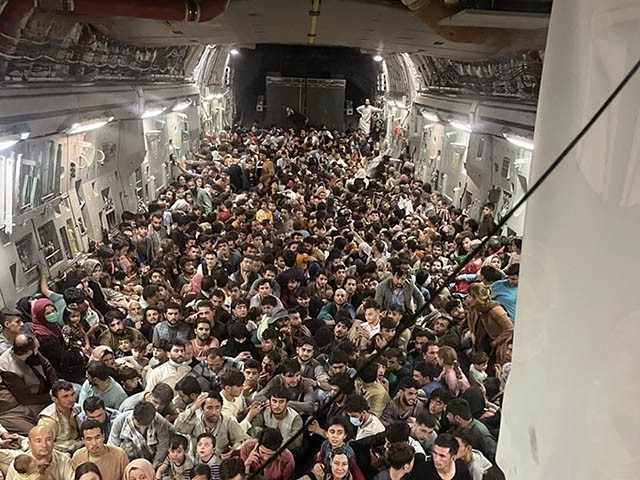President Joe Biden’s administration may balloon the number of Afghans set to be resettled across the United States following the withdrawal of U.S. Armed Forces from Afghanistan.
Days ago, Pentagon officials stated up to 22,000 Afghans — mostly applying for Special Immigrant Visas (SIVs) and the newly-created P-2 visa — would be arriving at three military bases: Fort Lee in Virginia, Fort Bliss in Texas, and Fort McCoy in Wisconsin.
On Thursday, though, refugee resettlement agencies told the Washington Post the number of Afghans “seeking evacuation through a U.S. visa program” is closer to 100,000 and could be as high as 300,000.

Afghan Special Immigrant Visa (SIV) applicants crowd into the Herat Kabul Internet café seeking help applying for the SIV program (Paula Bronstein/Getty Images)
Biden has already allocated an additional $500 million to resettle Afghans.
Regardless, Biden has ensured that states and local jurisdictions will not have any say in whether Afghans are resettled in their communities.
In September 2019, former President Trump issued an executive order that gave state governors, county officials, and local governments the power to veto refugee resettlement in their communities. The order was a major win for activists, specifically in Tennessee, who had fought the Obama administration for its dumping of refugees across the state without any input from the governor, mayors, and local citizens.

Afghan citizens pack inside a U.S. Air Force C-17 Globemaster III, as they are transported from Hamid Karzai International Airport in Afghanistan, Sunday, Aug. 15, 2021. The Taliban on Sunday swept into Kabul, the Afghan capital, after capturing most of Afghanistan. (Capt. Chris Herbert/U.S. Air Force via AP)
By January 2020, a federal judge granted a nationwide preliminary injunction — requested by refugee contractors who sued over Trump’s order — that stripped states and local jurisdictions of their veto power until the case was settled.
In early February 2020, Biden rescinded Trump’s order.
Then, in January, a panel of three judges on the Fourth Circuit Court of Appeals, two liberals appointed by President Obama and one liberal appointed by President Clinton, upheld the previous court decision that banned implementation of Trump’s order.
Republican attorneys general have yet to file a lawsuit against Biden for his rescinding of Trump’s order, seemingly the only route through the courts that could reverse the move and give veto power back to states and local jurisdictions over refugee resettlement.
Over the last 20 years, nearly a million refugees have been resettled in the nation — more than double that of residents living in Miami, Florida, and it would be the equivalent of annually adding the population of Pensacola, Florida.
Refugee resettlement costs American taxpayers nearly $9 billion every five years, according to research, and each refugee costs taxpayers about $133,000 over the course of their lifetime. Within five years, an estimated 16 percent of all refugees admitted will need housing assistance paid for by taxpayers.
John Binder is a reporter for Breitbart News. Email him at jbinder@breitbart.com. Follow him on Twitter here.

COMMENTS
Please let us know if you're having issues with commenting.